








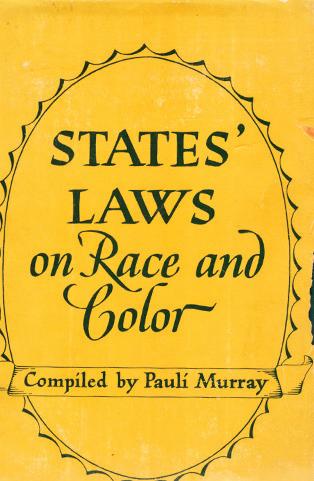
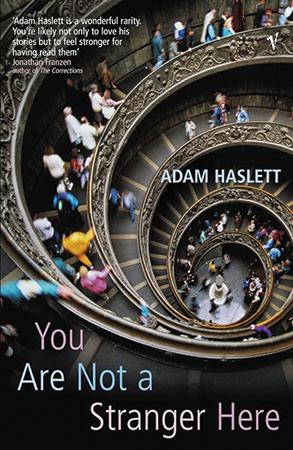
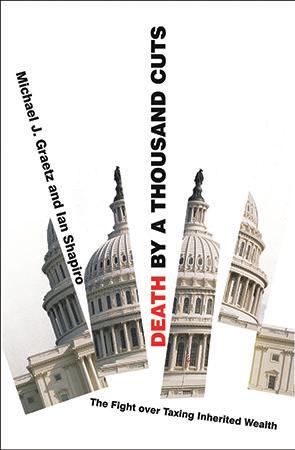















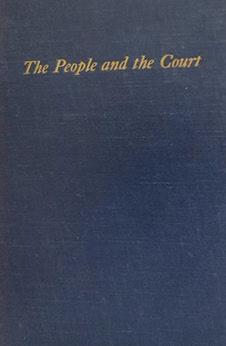











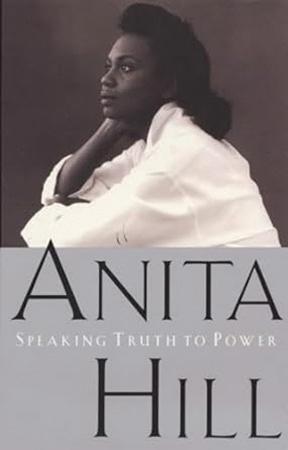
































































































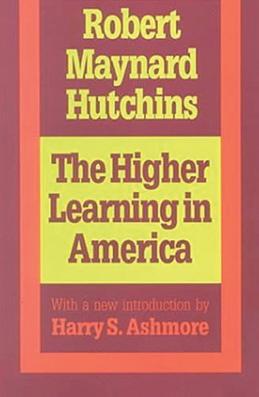



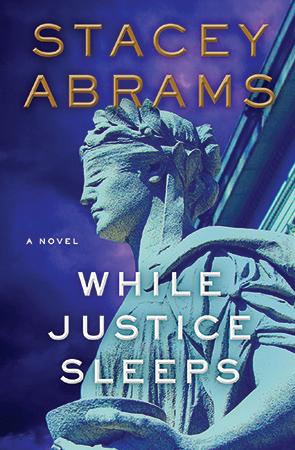






























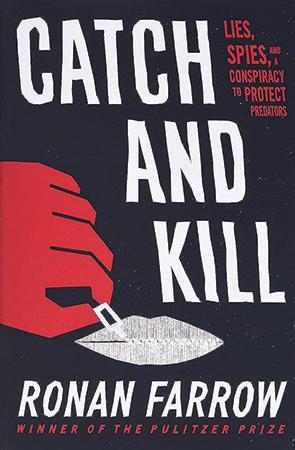

































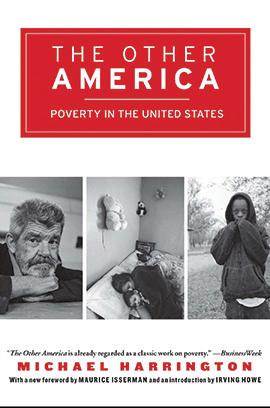






On the occasion of Yale Law School’s 200th anniversary, librarians Fred Shapiro and Nicholas Mignanelli have assembled an exhibit of 200 books authored or edited by faculty and alumni. This is not an exhibit of the “best” or “most important” books, but rather it is intended to be a selection illustrating the variety of published volumes by members of the Yale Law School community. Many of the works listed are scholarly monographs. Others are legal treatises. Still others are casebooks. It is difficult to give examples of these three genres, or of the “nonlegal” books, because so many of them transcend categories. In the hands of Yale Law School authors, scholarly monographs may be powerful arguments on public policy or brilliant tools for instruction. Treatises may be masterpieces of scholarship. Casebooks may define new fields. The nonlegal volumes may motivate lawyers in a multitude of ways.
Of course, the major role of books at Yale Law School has been to disseminate scholarship, teaching, and activism. A large portion of the legal ideas and reforms of the last century have sprung from books written by Yale Law School professors and alumni. The law and its ideas have been inspired, synthesized, and communicated by these volumes. In addition, the range and talent of the School’s affiliates have spilled over into nonlegal works of public policy, social science, literature, and even popular culture.












Although categorization can be difficult, taking notice of some remarkable items is irresistible. Arthur Corbin’s (Class of 1899) Corbin on Contracts has been called “the greatest law book ever written.” Louis Loss’s ’37 Securities Regulation shaped the law of securities. Walter Lord’s ’46 A Night to Remember is the definitive account of the sinking of the Titanic. Michael Harrington’s ’50 law The Other America inspired Lyndon Johnson’s “War on Poverty.” Boris Bittker’s ’41 pioneering The Case for Black Reparations was edited by a young Random House editor named Toni Morrison. Catharine MacKinnon’s ’77 landmark Sexual Harassment of Working Women was based on a Law School student paper. Oliver Williamson’s The Economic Institutions of Capitalism helped win its author the Nobel Prize in Economics. James Forman Jr.’s ’92 Locking Up Our Own was awarded a Pulitzer Prize. Robert Post’s ’77 The Taft Court derived funding from Oliver Wendell Holmes Jr.’s bequest to the United States of America.
See the full list of books on the following pages.

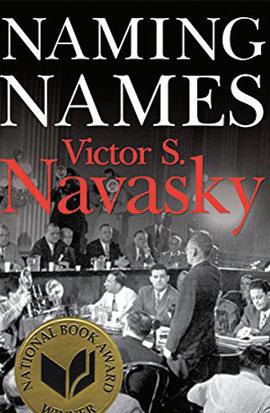
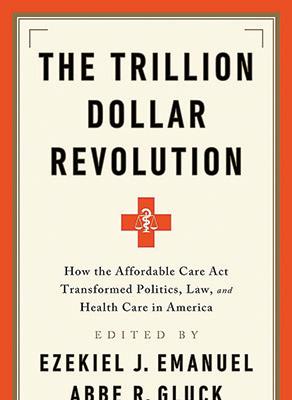














200 years, 200 books*
By Alumni and Former Faculty
Floyd Abrams 1959, Speaking Freely
Stacey Abrams 1999, While Justice Sleeps
Renata Adler 1979, Reckless Disregard
Thurman Arnold, The Folklore of Capitalism
Thurman Arnold, The Symbols of Government
Simeon Baldwin 1862 law, The American Judiciary
Aharon Barak, The Judge in a Democracy
Emily Bazelon 2000, Charged Judah Benjamin 1827 law, A Treatise on the Law of Sale of Personal Property
Dwayne Betts 2016, Bastards of the Reagan Era
Alexander Bickel, The Least Dangerous Branch
Alexander Bickel, The Morality of Consent
Boris Bittker 1941, The Case for Black Reparations
Boris Bittker, Federal Taxation of Income, Estates, and Gifts
Charles Black 1943 and Philip Bobbitt 1975, Impeachment
Charles Black, The People and the Court
Charles Black, Structure and Relationship in Constitutional Law
Philip Bobbitt, Constitutional Fate
David Boies 1966, Courting Justice
Cory Booker 1997, United Edwin Borchard, Convicting the Innocent
Edwin Borchard, The Declaratory Judgment
Robert Bork, The Antitrust Paradox
Robert Bork, The Tempting of America
Lea Brilmayer, Justifying International Acts
Alexandra Brodsky 2016, Sexual Justice
Tamiko Brown-Nagin 1997, Courage to Dissent
Guido Calabresi 1958, A Common Law for the Age of Statutes
Guido Calabresi, The Costs of Accidents
Guido Calabresi, Tragic Choices
Charles Clark 1913, Handbook on the Law of Code Pleading
Bill Clinton 1973, My Life
Here’s a sampling of the many other books recently written or edited by our alumni, faculty, staff, and students. We welcome your submissions. Please contact us: lawreport@yale.edu.

Ray Brescia
Lawyer Nation: The Past and Future of the American Legal Profession
New York University Press, 2024
Brescia ’92 surveys how lawyers have shaped U.S. history while also considering what lies ahead for the profession. He discusses compounding crises — which include authoritarian threats, prohibitive barriers to legal services, and looming questions about artificial intelligence — that face the law today. Drawing on his career in public interest, Brescia urges lawyers to transform their field.


Steven Brill
The Death of Truth Knopf, 2024
Brill ’75 traces how profit-driven algorithms have shattered public faith in even the most indisputable facts. He argues that the rise of conspiracy theories, misinformation, and “alternative facts” all symptomize a systematic assault on truth. The Death of Truth chronicles boardroom decisions and backdoor deals that have exploited human psychology, promulgated lies, and fomented division. A cofounder of the news rating system NewsGuard, Brill draws from his experience to propose solutions.
Legal history of conflict
In her new book They Called It Peace, Lauren Benton charts the history of so-called small wars in European empires. She describes a state of perpetual war in which fighting occurred in seemingly discrete conflicts between interludes of unstable peace. The book shows that “small” violence often served as a prelude to atrocities in empires.
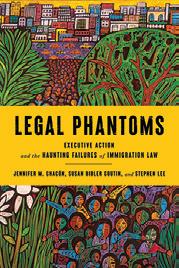
Jennifer Chacón, Susan Bibler Coutin, and Stephen Lee
Legal Phantoms: Executive Action and the Haunting Failures of Immigration Law
Stanford University Press, 2024
Chacón ’98, Coutin, and Lee chart how undocumented immigrants and their communities navigated the precarious decade that followed the creation of Deferred Action for Childhood Arrivals (DACA) in 2012. The co-authors draw from 135 interviews and focus group sessions conducted with immigrants, community organizers, lawyers, and policymakers.

Benton, the Barton M. Biggs Professor of History and Professor of Law, traces these patterns across five centuries. Early conquests featured cycles of raids, sieges, truces, and horrific acts of reprisal. In the 19th century, imperial armies and navies acted as enforcers of global order. They turned series of brief interventions into sustained campaigns of violence against Indigenous communities. Benton describes her book as a legal history, not a study of military tactics. She approaches the evolution and application of the laws of war from the perspective of European and Indigenous participants in colonial conflicts. The result, Benton writes, is to treat law as “bigger than doctrine and less tidy than systems of rules and norms.”
Still, Benton is careful in describing what the book can teach about war and peace today. Histories of imperial violence, she suggests, mainly serve to warn us “to temper our expectations about humanity’s capacity to keep small wars small.” They also remind us that even seemingly minor conflicts make fertile ground for atrocities.

Ignacio Cofone
The Privacy Fallacy: Harm and Power in the Information Economy
Cambridge University Press, 2023
Cofone ’16 llm, ’18 jsd examines why the existing framework of privacy law fails to prevent profitdriven actors from exploiting data and exposing people to grievous harm. Whereas privacy law today assumes the relationship between corporations and online users to be contractual, Cofone theorizes privacy through the lens of tort law. He defines the “privacy fallacy” as the tendency to prioritize privacy only when tangible consequences are at stake. Cofone urges the law to recognize privacy’s intrinsic value.

Susan Crawford Charleston: Race, Water, and the Coming Storm Pegasus Books, 2024
Crawford ’89 delves into the perils that face Charleston, South Carolina, in the era of climate change. She surveys how Charleston’s unrestrained embrace of development is failing its most vulnerable communities — and perpetuating racial injustices that have long shaped the Holy City. Charleston spans the genres of science and narrative history, centering on Black residents’ family stories. Crawford examines how race and climate intersect in a city central to the nation’s history of racial violence and freedom struggles.

Avihay Dorfman and Alon Harel Reclaiming the Public
Cambridge University Press, 2024
Dorfman ’06 llm, ’08 jsd and Harel ’89 llm present a political theory of the public. The co-authors discuss the limits that characterize existing theories about the legitimacy of political authority and the nature of law. They argue that public institutions must reflect the perspectives of citizens, and that the public is responsible for the decisions made by such institutions. They also describe the goods that public institutions must provide. Finally, they contend that AI-generated decisions cannot qualify as public.

Richard Falk and Hans von Sponeck
Liberating the United Nations: Realism with Hope
Stanford University Press, 2024
Falk ’55 and von Sponeck argue that the United Nations must be reformed to meet the moral imperatives of its mission. The co-authors discuss the organization’s history, recounting pivotal moments that precluded the U.N. from becoming more just and egalitarian. Falk and von Sponeck consider three case studies of intervention — in Palestine, Iraq, and Syria — to assess what role the U.N. has come to play in global politics. Liberating the United Nations draws from both authors’ experiences as high-level U.N. diplomats.

Scott Hershovitz Law Is a Moral Practice
Harvard University Press, 2023
While law and morality are often thought to be separate, Hershovitz ’04 argues that law fundamentally concerns moral questions. He investigates the moral principles that underpin the judicial system, explaining how courts assess the rights and responsibilities that one party owes to another. Hershovitz also traces the moral contours behind contemporary debates about how to interpret the Constitution and what obligation individuals have to follow the law. His account bridges the schools of positivism and natural law.

Michael Klausner and Guhan Subramanian Deals: The Economic Structure of Business Transactions
Harvard University Press, 2024 Klausner ’81 and Subramanian explain the economic concepts that underpin successful business deals and develop a framework to grasp how such transactions work in practice. The co-authors discuss a range of real-world examples, which span from entertainment to software. They demonstrate how deals can fulfill their twofold objective: to maximize combined value and share that value across parties. The co-authors draw from their extensive experiences teaching and advising on business deals.
Hillary Rodham Clinton 1973, Living History
Felix Cohen, The Handbook of Federal Indian Law
Morris Cohen, Bibliography of Early American Law
Jules Coleman 1976 msl , The Philosophy of Law
Walter Wheeler Cook, The Logical and Legal Bases of the Conflict of Laws
Arthur Corbin 1899, Corbin on Contracts
Vern Countryman 1949 law, Debtors’ and Creditors’ Rights
Robert Cover, Justice Accused
William Crosskey 1926, Politics and the Constitution in the History of the United States
Harlon Dalton 1973, Racial Healing
Mirjan Damaška, The Faces of Justice and State Authority
Alan Dershowitz 1962, Reversal of Fortune
John F. Dillon, The Laws and Jurisprudence of England and America
William O. Douglas, Go East, Young Man
Theodore Dwight 1842 law, A Report on the Prisons and Reformatories of the United States and Canada
Marian Wright Edelman 1963, The Measure of Our Success
Robert Ellickson 1966, Order Without Law
John Hart Ely 1963, Democracy and Distrust
Thomas Emerson 1931, Political and Civil Rights in the United States
Thomas Emerson, The System of Freedom of Expression
Richard Epstein 1968, Takings
Ronan Farrow 2009, Catch and Kill
Owen Fiss, A Way Out
Gerald Ford 1941, A Time to Heal
Abe Fortas 1933, Concerning Dissent and Civil Disobedience
Jerome Frank, Law and the Modern Mind
John P. Frank 1947 jsd, Marble Palace
Grant Gilmore 1943, The Ages of American Law
Grant Gilmore, The Death of Contract
Grant Gilmore, Security Interests in Personal Property
Jack Goldsmith 1989, The Limits of International Law
Joseph Goldstein 1952, Beyond the Best Interests of the Child
Michael Graetz, Death by a Thousand Cuts
Leon Green, Rationale of Proximate Cause
Linda Greenhouse 1978 msl , Becoming Justice Blackmun
Lani Guinier 1974 and Gerald Torres 1977, The Miner's Canary Walton Hamilton, Price and Price Policies
Henry Hansmann 1974, The Ownership of Enterprise
Fowler Harper and Fleming
James 1928, The Law of Torts
Michael Harrington 1950 law, The Other America
Jill Hasday 1997, Intimate Lives and the Law
Adam Haslett 2003, You Are Not a Stranger Here
John Heinz 1962, Chicago Lawyers
Frederick Hicks, Materials and Methods of Legal Research
A. Leon Higginbotham Jr. 1952, In the Matter of Color
Anita Hill 1980, Speaking Truth to Power
Wesley Hohfeld, Fundamental Legal Conceptions as Applied to Judicial Reasoning and Other Legal Essays
Robert Hutchins 1925, The Higher Learning in America
Philip Jessup 1924, A Modern Law of Nations
Van Jones 1993, The Green Collar Economy
Neal Katyal 1995, Impeach
Jay Katz, The Silent World of Doctor and Patient
Duncan Kennedy 1970, Legal Education and the Reproduction of Hierarchy
Randall Kennedy 1982, Interracial Intimacies
John Langbein, The Origins of Adversary Criminal Trial
Harold Lasswell, Power and Society
David Lat 1999, Supreme Ambition
Edward Lazarus 1987, Closed Chambers
Raphael Lemkin, Axis Rule in Occupied Europe
Lawrence Lessig 1989, Code and Other Laws of Cyberspace
Edward Levi 1938 jsd, Introduction to Legal Reasoning
Arthur Liman 1957, Lawyer
Karl Llewellyn 1918 llm, 1920 jsd, The Bramble Bush
Karl Llewellyn, Cases and Materials on the Law of Sales
Karl Llewellyn, The Common Law Tradition
Walter Lord 1946, A Night to Remember
Louis Loss 1937, Securities Regulation
Catharine MacKinnon 1977, Feminism Unmodified

Alison L. LaCroix
The Interbellum Constitution: Union, Commerce, and Slavery in the Age of Federalisms
Yale University Press, 2024 LaCroix ’99 presents a new history of federalism in the early United States. She traces how conflicting visions of federal authority animated U.S. politics during the interbellum period, which followed the War of 1812 and preceded the Civil War. Contrary to conventional assumptions, LaCroix argues that a host of federalisms circulated in these decades. She examines how constituencies across the new nation contested the Constitution’s meaning. Her account contextualizes and expands constitutional debates today.

Lawrence Lessig and Matthew Seligman How to Steal a Presidential Election
Yale University Press, 2024
Lessig ’89 and Seligman warn that the results of the next presidential election could be overturned, even in perfectly legal ways. The coauthors detail the vulnerabilities, which range from vice-presidential intervention to electoral decertification, that authoritarian forces could exploit to undo the people’s will. Lessig and Seligman assess the plausibility of each, bearing in mind lessons from the Jan. 6, 2021, insurrection. They exhort lawmakers and the public to protect democracy while time remains.

Melissa Murray and Andrew Weissmann
The Trump Indictments: The Historic Charging Documents with Commentary W. W. Norton & Company, 2024 Murray ’02 and Weissmann annotate the four criminal indictments against former U.S. President Donald Trump. The co-authors give historical context and legal analysis for each of the cases, which concern the Jan. 6, 2021, insurrection; election interference; retention of classified documents; and the payment of “hush money.” The coauthors also provide a comparative view of prosecution against former political leaders.
Four capital punishment cases argued by Stephen Bright
In his book Demand the Impossible: One Lawyer’s Pursuit of Equal Justice for All, Robert L. Tsai ’97 chronicles how Yale Law School’s Harvey L. Karp Visiting Lecturer in Law Stephen B. Bright has confronted staggering injustice in the criminal legal system. To trace his subject’s remarkable career as a civil rights litigator, Tsai narrates the four capital punishment appeals that Bright has argued — and won — before the U.S. Supreme Court.

Robert L. Tsai
Demand the Impossible: One Lawyer’s Pursuit of Equal Justice for All W. W. Norton & Company, 2024
Tsai delves into the world of each case, recounting how Bright uncovered grievous miscarriages of justice against Black, disabled, and indigent defendants. In the first three appeals, Bright demonstrated that prosecutors had committed race discrimination in jury selection. In the fourth, Bright proved that the state had illegally denied his client an independent mental health expert during trial. Tsai examines the principles of equal justice that propelled each case — while also introducing readers to the death-sentenced clients whom Bright represented.
Demand the Impossible considers the lessons that Bright’s distinctive ethos of legal advocacy holds for social change today. Bright and his allies, Tsai notes, faced strong crosswinds in each case, which spanned from 1988 to 2017. In an era when mass incarceration held sway across the political spectrum, Bright exposed the realities of systemic racism, prosecutorial misconduct, and indefensible barriers to legal representation. Bright’s lifelong efforts to advance equal rights, Tsai argues, give reason for hope.
In long-awaited volume, Post tells story of the Taft Court in its own time
After 35 years and 1,608 pages, Sterling Professor of Law Robert C. Post ’77 has written the definitive history of the U.S. Supreme Court under Chief Justice William Howard Taft.
The Taft Court: Making Law for a Divided Nation, 1921–1930 is the long-awaited 10th volume of the Oliver Wendell Holmes Devise History of the Supreme Court of the United States.

In 1920, voters elected Warren G. Harding president on a platform of returning the country to normalcy after the massive changes produced by the first World War.
“Jazz, flappers, radio, and cars burst onto the scene,” Post writes. “Yet so did Prohibition, fundamentalism, the KKK, and 100 percent Americanism.”

Robert C. Post
The Taft Court: Making Law for a Divided Nation, 1921–1930
Cambridge University Press, 2023
In the 1920s, Americans sought both to resurrect old pieties and vigorously to pursue brave new innovations.
Harding appointed four new justices in less than 18 months. He conceived of the Court as an instrument for returning the country to antebellum principles. Foremost among these were the restoration of the constitutional values of substantive due process and federalism. The federal government exercised more detailed economic control than ever before or since.
President Woodrow Wilson’s wartime policies were considered both terrifying and necessary. They opened new possibilities that were attractive and yet profoundly disorienting.
“The Taft Court was charged with the thankless task of constructing law for a society that was deeply confused about what it wanted,” Post writes. Thus, the Taft Court sustained the Transportation Act of 1920, which converted the ICC into the governor of virtually all railroads, both interstate and intrastate, and yet it struck down the Child Labor Tax Act.
In an effort to restore antebellum values, the Taft Court revived the doctrine of Lochner v. New York, which put the burden of justifying social and economic regulation squarely on the government. The Court’s doctrinal innovations were so severe that they would lead directly to the crisis of the New Deal during the next decade.
Political divisions in the internet age

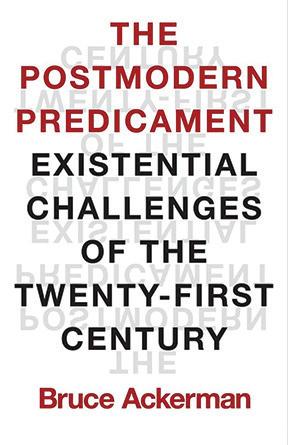
Bruce Ackerman
The Postmodern Predicament: Existential Challenges of the 21st Century
Yale University Press, 2024
“What should I make of my life?” “Who am I?” “Does the earth move around the sun?” According to Sterling Professor of Law and Political Science Bruce Ackerman ’67, finding answers to such existential questions requires looking at the virtual and physical realities that make up a modern-day life. In his latest book, The Postmodern Predicament: Existential Challenges of the 21st Century, Ackerman explores the heightened complexities of existentialism brought forth by the technological era and the impact these have on political alienation today. Broken into three parts, the book studies the fragmented reality that has developed out of the internet age, where behaviors exhibited in an online forum don’t align with those presented in the physical world. The result, according to Ackerman, leads to increased political divisions. The first part examines if a virtual reality can truly take the place of real-world experiences, while the second part asserts that it can’t, stating there are “fundamental aspects of human experience that are threatened by our postmodern effort to escape the dilemmas of realworld existence by endlessly clicking into virtual reality.” One concern Ackerman mentions is the influx of misinformation on the internet which, in some cases, stems from corrupt politicians and contributes to societal divisions.
Like the philosophers Simone de Beauvoir and Jean-Paul Sartre, Ackerman considers the fragmentation of modern life as a central source of contemporary anxieties, particularly as they pertain to politics. In the third and final part of the book, he proposes concrete reforms that could mobilize broad-based support for democracy against demagogic assaults on its very foundations. Some of these include universal childcare, which Ackerman contends “reinvigorates democracy by demonstrating its capacity to respond decisively to an existential dilemma that almost every voter recognizes,” and “Deliberation Day,” a national holiday that would encourage citizens to discuss political issues ahead of an election, thus upholding their democratic responsibilities.
Catharine MacKinnon, Sexual Harassment of Working Women
Catharine MacKinnon, Toward a Feminist Theory of the State
Jerry Mashaw, Greed, Chaos, and Governance
Mark McCormack 1954, The Terrible Truth About Lawyers
Myres McDougal 1931 jsd, Law and Minimum World Public Order
Myres McDougal and Harold Lasswell, Human Rights and World Public Order
Martha Minow 1979, Making All the Difference
J. W. Moore 1935 jsd, Collier on Bankruptcy
J. W. Moore, Moore's Federal Practice
Pauli Murray 1965 jsd, Proud Shoes
Pauli Murray, Song in a Weary Throat
Pauli Murray, States' Laws on Race and Color
Victor Navasky 1959, Naming Names
Eleanor Holmes Norton 1964, Fire in My Soul
Matthew Pearl 2000, The Dante Club
Jean Koh Peters, Representing Children in Child Protection Proceedings
Charles Reich 1952, The Greening of America
Charles Reich,
The Sorcerer of Bolinas Reef W. Michael Reisman
1964 llm, 1965 jsd, Law in Brief Encounters
Richard Revesz 1983, Retaking Rationality
Deborah Rhode 1977, The Beauty Bias
William C. Robinson, Elementary Law
Fred Rodell 1931, Nine Men Fred Rodell, Woe Unto You, Lawyers!
Carol Rose and Richard Brooks, Saving the Neighborhood
Susan Rose-Ackerman, Corruption and Government
Eugene Rostow 1937, The Sovereign Prerogative
Gretchen Rubin 1994, The Happiness Project
Peter Schuck, Agent Orange on Trial
Fred Shapiro, The New Yale Book of Quotations
James Simon 1964, Independent Journey
John Simon 1953, The Ethical Investor
Sonia Sotomayor 1979, Turning Pages
Robert Stevens 1958 llm, Law School
Christopher Stone 1962, Should Trees Have Standing?
William Howard Taft, The Anti-Trust Act and the Supreme Court
Clarence Thomas 1974, My Grandfather's Son
Mark Tushnet 1971, Red, White, and Blue
J.D. Vance 2013, Hillbilly Elegy
Oliver Williamson, The Economic Institutions of Capitalism
Theodore D. Woolsey, Lectures on International Law in Times of Peace
Theodore D. Woolsey, Introduction to the Study of International Law
Charles Alan Wright 1949, Federal Practice and Procedure
Charles Alan Wright, The Law of Federal Courts
Elizabeth Wurtzel 2008, Prozac Nation
Kenji Yoshino 1996, Speak Now
Monica Youn 1998, Blackacre
By Current Faculty
Bruce Ackerman 1967, Social Justice in the Liberal State
Bruce Ackerman, We the People
Anne Alstott 1987, No Exit
Akhil Reed Amar 1984, The Bill of Rights
Akhil Reed Amar, America's Constitution
Ian Ayres 1986, Insincere Promises
Aslı Ü. Bâli 1999, Federalism and Decentralization in the Contemporary Middle East and North Africa
Jack Balkin, Living Originalism
Lauren Benton, They Called It Peace
Stephen Carter 1979, The Emperor of Ocean Park
Amy Chua, Battle Hymn of the Tiger Mother
Justin Driver, The Schoolhouse Gate
William Eskridge Jr. 1978, Cases and Materials on Legislation
William Eskridge Jr., The Case for Same-Sex Marriage
Daniel Esty 1986, Green to Gold
James Forman Jr. 1992, Locking Up Our Own
Heather Gerken, The Democracy Index
Abbe R. Gluck 2000 and Ezekiel J. Emanuel, The Trillion Dollar Revolution
Oona Hathaway 1997 and Scott Shapiro 1990, The Internationalists
Balkin argues that history is shaped through the arguments law makes

In his book Memory and Authority: The Uses of History in Constitutional Interpretation, Jack M. Balkin argues that debates about constitutional interpretation are often debates about collective memory — the stories that members of a community tell each other about the meaning of their shared past. Lawyers and judges are memory entrepreneurs; they try to persuade people to remember things differently. Each of the familiar forms of constitutional argument produces constitutional memory, engaging in a mixture of remembering and forgetting. Lawyers and judges construct — and erase — memory to lend authority to their present-day views; they make the past speak their values so they can then claim to follow it.

Jack M. Balkin Memory and Authority: The Uses of History in Constitutional Interpretation
Yale University Press, 2024
How the antitax movement has increased inequality
In his book The Power to Destroy: How the Antitax Movement Hijacked America, Michael J. Graetz argues that resistance to taxes has corroded U.S. politics far more than is often assumed.
Graetz, the Justus S. Hotchkiss Professor Emeritus of Law, writes that the campaign to curtail taxation has, for nearly 50 years, secured success by trafficking in racist tropes, stoking cultural flashpoints, and promoting questionable economics.

“Resistance to taxes in the United States,” he writes, “has a long pedigree: it is as American as apple pie and fried catfish.” The Power to Destroy takes its title from Chief Justice John Marshall’s statement in McCulloch v. Maryland, a landmark 1819 Supreme Court case that addressed disputes over federal and state taxation, that the power to tax involves “the power to destroy.” But while taxes have long been contested, Graetz argues that they only recently became a cudgel that would fracture the nation.
Balkin, the Knight Professor of Constitutional Law and the First Amendment, explains how the standard forms of legal argument shape how lawyers and judges employ history and what they look for in history. Lawyers and judges’ use of history is rhetorical, aimed at persuading audiences. They invoke the past to establish the authority of their positions and to undermine opposing ones. “There is no single modality of ‘historical argument,’” Balkin writes. “Rather, history is useful for making many different kinds of constitutional arguments, and the way that people use history is shaped by the kind of argument they are making.” By understanding how lawyers channel the past through standard forms of argument, historians can better join issue with lawyers about historical matters in constitutional interpretation. Originalism and living constitutionalism seem to be opposed approaches to the past. But Balkin argues that they are actually mirror images of a single phenomenon — how lawyers use history to adapt an ancient constitution to a constantly changing world.

Michael J. Graetz The Power to Destroy: How the Antitax Movement Hijacked America
Princeton University Press, 2024
To chronicle how the antitax movement amassed its influence, Graetz begins in 1978, the year that California voters amended the state’s constitution to curb any increase in property taxes. Proposition 13, as the measure was known, proved to be a watershed, spurring political operatives nationwide to seize on taxation.
In tandem with the Republican Party’s infamous Southern strategy using racist rhetoric to increase political support, antitax activists argued that white taxpayers were being made to subsidize Black welfare recipients. From there, the notion that taxes threaten freedom went mainstream.
“Contrary to common views,” he writes, “taxation is not solely about economics: cultural values are also at stake.” Noting that more Americans pay taxes than vote in presidential elections, Graetz considers what tax policies reveal about the public’s collective priorities and commitments. He argues that how the government levies taxes, and to what ends it uses them, are social and moral questions as much as economic and partisan ones.
An analysis of U.S. Supreme Court cases on voting rights
It was the spring semester of 2020. Sterling Professor Emeritus of Law Owen M. Fiss was teaching his class A Community of Equals, engaging students in discussions on civil rights laws pertaining to various topics, including voting. Fiss, who helped implement civil and voting rights laws in the 1960s, left the classroom discussion inspired and resolved to write his newest book, Why We Vote

Shortly after, Fiss found himself not only with an idea but a newfound abundance of time to write due to the COVID-19 pandemic. His work would prove to be timely, as the 2020 presidential election and Jan. 6, 2021, insurrection unfolded while penning the book. Fiss starts by outlining why the U.S. Supreme Court has a responsibility to uphold the democratic ideal of the Constitution, then delves into recent events that have threatened it.

Owen M. Fiss
Why We Vote
Oxford University Press, 2024
In the introduction, Fiss stresses the importance of voting: “Unlike the mob that stormed the Capitol on Jan. 6, 2021, those who do not vote or refrain from voting do not threaten violence. Nor do they obstruct the functioning of a governmental institution. Yet through their inaction, they too impair the political freedom of America that arises from the democratic character of its government and thus violate their elemental duty of citizenship. We vote to preserve democracy and thus our own freedom.”
Each chapter in Why We Vote focuses on Supreme Court cases that sought to enlarge the freedom that democracy generates, pointing to rulings that allowed citizens to vote, facilitated the exercise of their right to vote, ensured the equality of votes, and provided feasible access to the ballot for independent candidates and new political parties.
In a concluding chapter, Fiss writes, “The right to vote is the means by which the ruled participate in the process of selecting their rulers and thus is essential for the fulfillment of the democratic purpose of the Constitution. It presumes that one person’s right to vote is as worthy as another’s.”
Fiss credits Cara Meyer ’22, one of the students from his A Community of Equals class, for her role in the discussion that led to Why We Vote and for serving as his editor and research assistant.
ALSO OF NOTE
Günther Auth ’04 msl Kritische Theorien der Internationalen Beziehungen (Critical Theories of International Relations) De Gruyter Oldenbourg, 2023
Jonathan M. Barnett ’99 and Sean M. O’Connor, eds. 5G and Beyond: Intellectual Property and Competition Policy in the Internet of Things Cambridge University Press, 2023
David Bollier ’85 msl The Commoner’s Catalog for Changemaking Schumacher Center for a New Economics, 2021
Melissa J. Durkee ’04, ed. States, Firms, and Their Legal Fictions: Attributing Identity and Responsibility to Artificial Entities
Cambridge University Press, 2024
Kwame Frimpong ’74 llm, ’77 jsd Adanwomase to Yale Law School, 1973–2023: A 50-Year Journey Fulfilling Grandma’s Dream Digibooks, 2023
Jon Newman ’56 and Marin K. Levy ’07 Written and Unwritten: The Rules, Internal Practices, and Customs of the United States Court of Appeals Cambridge University Press, 2024
Donald Nicolson, JoNel Newman ’86, and Richard Grimes How to Set up and Run a Law Clinic: Principles and Practice
Edward Elgar Publishing, 2023
David M. O’Brien and Gordon Silverstein
Constitutional Law and Politics: Struggles for Power and Governmental Accountability (12th Edition)
W. W. Norton & Company, 2023
Elizabeth Hinton, America on Fire
Christine Jolls, Behavioral Economics and the Law
Paul Kahn 1980, The Reign of Law
Amy Kapczynski 2003, Access to Knowledge in the Age of Intellectual Property
Harold Hongju Koh, The National Security Constitution
Issa Kohler-Hausmann 2008, Misdemeanorland
Anthony Kronman 1975, Education's End
Douglas Kysar, Regulating from Nowhere
Yair Listokin 2005, Law and Macroeconomics
Jonathan Macey 1982, Corporate Governance
Daniel Markovits 2000, The Meritocracy Trap
Tracey Meares and Dan Kahan, Urgent Times
John Morley 2006, Research Handbook of Mutual Funds
Samuel Moyn, The Last Utopia
Douglas NeJaime, Cases and Materials on Sexual Orientation and the Law
Nicholas Parrillo 2004, Against the Profit Motive
Robert Post 1977, Democracy, Expertise, & Academic Freedom
Robert Post, The Taft Court
Claire Priest 2001, Credit Nation
George Priest, The Rise of Law and Economics
Ketan Ramakrishnan 2021, Ethics and Existence
Judith Resnik and Dennis Curtis 1966, Representing Justice
Cristina Rodríguez 2000, The President and Immigration Law
Roberta Romano 1980, The Genius of American Corporate Law
Jed Rubenfeld, Freedom and Time
David Schleicher, In a Bad State
Alan Schwartz 1964, Foundations of Contract Law
Scott Shapiro 1990, Legality
Reva Siegel 1986 and Linda Greenhouse 1978 msl , Before Roe v. Wade
Kate Stith, Fear of Judging
Tom Tyler, Why People Obey the Law
James Whitman 1988, Hitler's American Model
John Fabian Witt 1999, The Accidental Republic
Gideon Yaffe, The Age of Culpability
Taisu Zhang 2008, The Laws and Economics of Confucianism